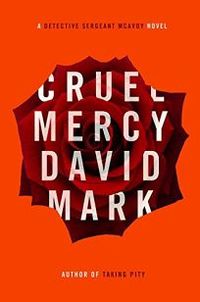Cruel Mercy by David Mark
 Monday, June 19, 2017 at 10:34AM
Monday, June 19, 2017 at 10:34AM 
Published by Penguin Random House / Blue Rider Press on February 7, 2017
Irish priests have always been popular characters in fiction. Father Jimmy Whelan, a priest in Galway who was raised in the Bronx, figures prominently in the latest Aector McAvoy novel. Where there are priests there are sinners, and several of those appear in Cruel Mercy, perhaps including Father Whelan. An undeniable sinner is known as the Penitent, although he fancies himself to have been transformed from sinner to redeemer. Any reasonable deity would think otherwise.
Sergeant McAvoy travels to New York because Brishen Ayres, dubbed the Miracle Man by the press, survived being shot in the head, although he is in a coma. Ayres, a boxing coach, brought a young man to America from Ireland to explore the lad’s prospects for a professional boxing career. The boxer is killed in the assault that Ayres survives. Additional mayhem ensues during the incident that takes the boxer’s life.
McAvoy’s boss, Trish Pharaoh, sends McAvoy to investigate, in part because of McAvoy’s family connection to a Traveler who apparently followed the boxer (also a Traveler) to New York. The concern is that the Travelers are involved in a family feud and that Ayres was caught in the middle, although McAvoy isn’t so sure.
In addition to the Travelers, the priest, and the Penitent, a Mafia enforcer named Claudio, a few other Mafia members, and a group of Chechen criminals join the cast in Cruel Mercy. McAvoy, of course, is caught in the middle of all of them. Most creepy fictional villains are too contrived to be anything but ridiculous, but David Mark invents a couple of creepy villains in Cruel Mercy who seem chillingly real.
The plot weaves layers of complexity without becoming muddy. Cruel Mercy isn’t for readers with a short attention span (plenty of modern thriller writers cater to that audience), but for those readers who persevere, the surprising payoff is rewarding. There are no loose ends in this carefully woven story.
Given the novel’s religious characters, it isn’t surprising to learn that the nature of sin and absolution are among the novel’s themes. The novel asks whether confession and forgiveness of sins are seen as a “get out of Hell free” card by people who only repent until the time comes to sin again. Characters have different ideas about how and whether their actions will affect their afterlives, but the best model is McAvoy, who doesn’t know what to believe and isn’t particularly religious, preferring to live as honestly and helpfully as he can because it is the right thing to do, not because he expects to be rewarded for his efforts after death.
Cruel Mercy is just as enjoyable as other entries in the McAvoy series. McAvoy’s fundamental decency makes him sympathetic but he never becomes sanctimonious. It is such a pleasure to spend time with him that I’m surprised the McAvoy series doesn’t have more followers.
RECOMMENDED
Reader Comments